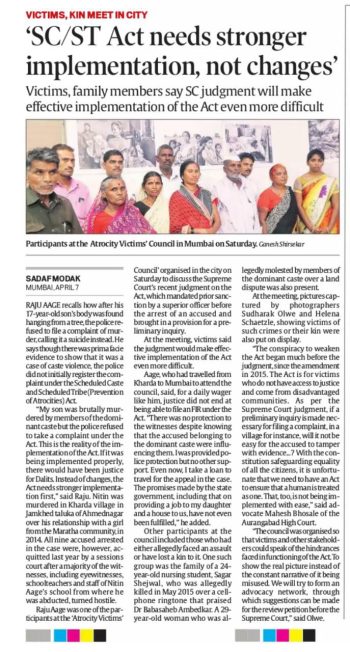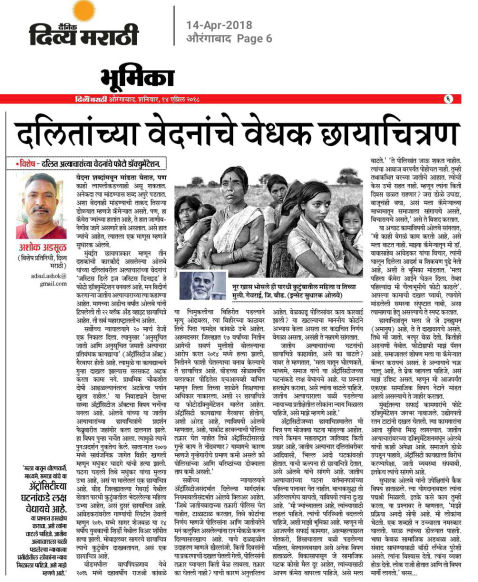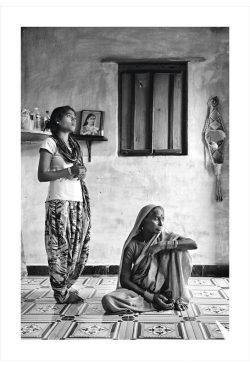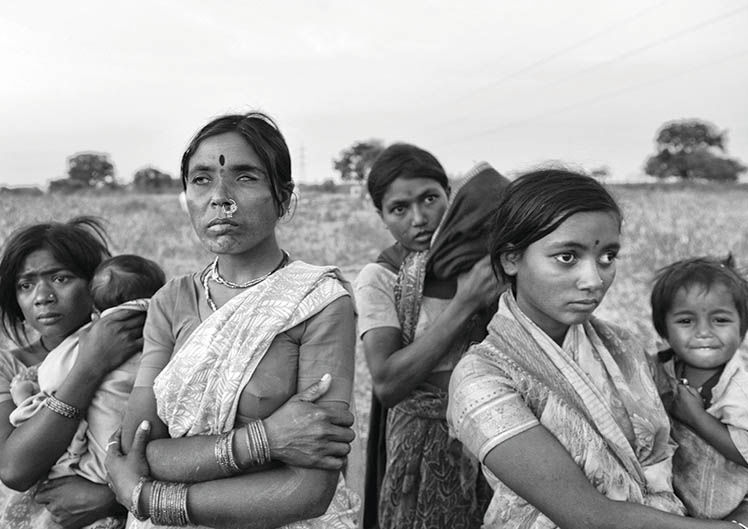Atrocity Victims Council
Caste-based atrocities and communal violence have divided the nation in the last
few years. The recent judgement of Hon’ble Supreme Court on Prevention of
Atrocities Act has generated insecurity and aggression in Dalits and minorities
across the country. To address this recent issue, The Atrocity Victims’ Council was
convened at the Mumbai Marathi Patrakar Sangh on 7th of April 2018. Victims and
Activists shared their stories and experiences with the press and the public.
few years. The recent judgement of Hon’ble Supreme Court on Prevention of
Atrocities Act has generated insecurity and aggression in Dalits and minorities
across the country. To address this recent issue, The Atrocity Victims’ Council was
convened at the Mumbai Marathi Patrakar Sangh on 7th of April 2018. Victims and
Activists shared their stories and experiences with the press and the public.
Atrocity Victims Council
Justice Delayed is Justice Denied
In the wake of the recent judgment by the Hon’ble Supreme Court of India which has led to certain tweaks in the Scheduled Caste and Scheduled Tribe (Prevention of Atrocities) Act (Or SC/ST Act), it is essential to understand that this judgement has triggered unrest and insecurity among the Dalit masses which are historically denied justice in our society.
The one-day meet, organised by the Atrocity Victims’ Council on April 7th, 2018, was an attempt to highlight the accounts of the victims, which need and deserve to be heard as their voices are usually stifled by the ones of the wrong-doers. The 6-hour long meet saw the presence of the likes of Dr. Balchandra Mungekar, Ex-member of Parliament and Planning Commission, Mr. Bharat Shelke, Ex-ACP, Crime Branch, Advocate Nitin Satpute (Bombay High Court), Advocate Mahesh Bhosale, practising lawyer at Aurangabad High Court, Dr. Vinod Kumar from Forensic Department, JJ Hospital, activists like Manisha Tokle, Ashok Tangade, Vaibhav Gite, Kabirdas Kamble, Ravindra Bansode, Sudhakar Kashyap, Pallav and PS Khandare. Furthermore, journalists were also present to provide their valuable insights to the victims present at the gathering.

When the Photography Promotion Trust team photo documented the cases from all over Maharashtra, it became clear that in most of the cases the victims were ready to fight but there was io mechanism to help them holistically. The activists are working relentlessly, but they are not aware of the mechanism to help them for strengthening their capacity. On the other hand, there are experts in the society but are unwilling to support because of lack of the initial contact with the victims.
At an individual level, the struggle of every atrocity victim begins with delay in lodging of the FIR, hesitance in incorporating the sections of Atrocity Act and expecting fair investigation in the case. Lack of legal knowledge, structural inequalities combined with castiest institutions exacerbates the struggle of the victim for justice. If you look at the rural pockets, the entire system apparently is trying to defend the accused through different mechanisms. In this context, the recent Supreme Court judgment contends that the police officer or the government officer and other employees should not be arrested directly without prior investigation dilutes the law further. The bench further argued that they were no restrictions on the anticipatory bail in the Atrocity Act. This judgment has diluted the new amendment of the POA Act 2016 which came with new provisions and empowered the victim.
On arguments with respect to the misuse of the Act, Advocate Mahesh Bhosale countered that “An atrocity is committed relatively more on the poor and less educated people who live in the rural pockets who struggle to make their ends meet. And, mostly it is observed that the ones who tend to bring out the fake cases are politically active, economically strong and use the Atrocity Act as a weapon. Who would want to register a fake case stating that he has been insulted or victimised just for the sake of getting compensation? On the contrary, one should note if the compensation or police protection is given at all to the victims. Furthermore, non-political organisations should be employed at taluka level during investigations.”


“How can one register a fake atrocity case when I have personally seen several poor and starving victims refusing money offered to them to withdraw cases! And in situations when the victims have settled the cases, they have done so because of the necessity of living in the same village and lack of finance and not because they have been bribed.”
– Manisha Tokle, Human Rights Activist


In the weeks preceding the Council, an Exhibition of the pictures shot by the Photography Promotion Trust were displayed at the Jehangir Art Gallery. The main objective of this and other such exhibitions is to provide a visual side to the written stories of these victims and get the public to pay more attention to such issues.
A panel discussion which followed was moderated in order to understand atrocity both in terms of theory and practice. The present dignitaries vehemently stated that the Act is not implemented properly in first place, thus, there is no question of its misuse. Be it compensation, appointing a special public prosecutor, or giving police protection, the victims struggle at every level while fighting for the case. There is an urgent need of implementation of contingency plan in the Act by the state government. Furthermore, through this council, an advocacy network on atrocity will be formed to chart out an action plan and make suggestion for review petition in Supreme Court.
Forensic Expert Vinod Kumar stated strongly that the victims should be educated on the Atrocity Act so as to rightfully avail its provisions on time. Issues such as magistrate inquest, demanding post mortem under videography, asking for post mortem to be conducted in a a civil hospital instead of a normal PHC, demanding re-post mortem when not convinced, difference between grievance injury and simple injury, etc, are essential for the victims to know in order to make their case stronger.

Justice Delayed is Justice Denied
In rural Maharashtra, where caste prejudice is deeply ingrained in the society, a Dalit trying to assert his or her right is normally perceived as an attempt to swim against the tide. Photojournalist Sudharak Olwe dives into the lives of victims of atrocities and uncovers painful stories of murder, rape and torture.
Activists and all other professionals reiterated that educating and empowering the victims to fight their own cases is extremely essential. These victims don’t seek sympathy from people, they seek justice. It is time we stop reading the news of atrocities on Dalits from safe distances and take action so that the voices of these and several other victims are paid attention to.
